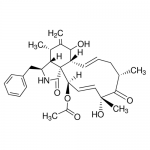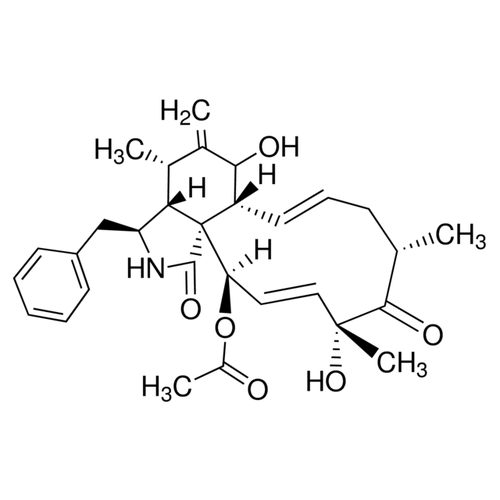| Product Name | Cytochalasin D |
| Description |
Actin polymerization inhibitor |
| Field of Use | Not for use in humans. Not for use in diagnostics or therapeutics. For in vitro research use only. |
Properties
| Solubility | Soluble to 10 mM in ethanol and to 50 mM in DMSO |
| Appearance | White Solid |
| Safety Phrases |
Classification: Toxic. May be harmful or fatal if inhaled, swallowed or absorbed through skin. Safety Phrases: S22 - Do not breathe dust S24/25 - Avoid contact with skin and eyes S36/37/39 - Wear suitable protective clothing, gloves and eye/face protection Risk Phrases: R62 - Possible risk of impaired fertility R68 - Possible risk of irreversible effects Hazard Phrases: H300-H361 Precautionary Phrases: P264-P281-P301 + P310 |
| Cite This Product | Cytochalasin D (StressMarq Biosciences, Canada, Cat # SIH-241) |
Biological Description
| Alternative Names | (3S,3aR,4S,6S,6aR,7E,10S,12S,13E,15R,15aR)-3-Benzyl-6-hydroxy-4,10,12-trimethyl-5-methylene-1-oxo-2,3,3a,4,5,6,6a,9,10,11,12,15-dodecahydro-1H-cycloundeca[d]isoindol-15-yl acetate, Zygosporin A |
| Scientific Background | Cytochalasins have the ability to bind to actin filaments and block polymerization and elongation of actin. As a result, they can change cellular morphology, inhibit cellular processes and cause cells to undergo apoptosis (1). Cytochalasin D in particular can inhibit protein synthesis (2). |
| References |
1. Haidle A., and Myers A. (2004) Proc Natl Acad Sci. 101(33): 12048-12053. 2. Ornelles et al., (1986) Mol Cell Biol. 6(5): 1650-1662. |



StressMarq Biosciences :
Based on validation through cited publications.